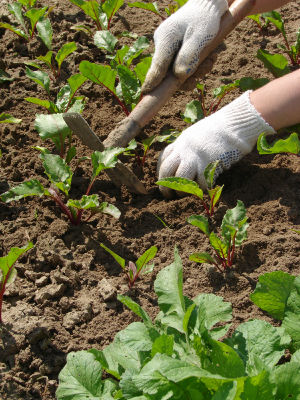 View and Print as PDF.
View and Print as PDF.
 As descendants of Adam (whose name is related to Adamah, the Hebrew word for earth) and Eve (in Hebrew, Chava, which is related to the Hebrew word for life), human beings have been charged with the sacred responsibility to tend to the life of the world that we have inherited. A midrash (narrative commentary) on Ecclesiastes teaches that when God created Adam, God led him around all the trees in the Garden of Eden. God said to him, “See how beautiful and praiseworthy all of My works are? Everything I have created has been created for Your sake. Think of this, and do not corrupt or destroy my world; for if you corrupt it, there will be no one to set it right after you” (Ecclesiastes Rabbah 7:13). Expulsion from the Divine garden offered humankind the opportunity to experience in the most literal ways what it is like to collaborate with G-d in continuing the ongoing work of Creation. Just as Genesis 3:23 explicitly states that, after the expulsion from the Garden, humankind will till and tend the soil, so does the midrash implicitly state that our thoughtful caretaking of God’s world includes the planting of new gardens.
As descendants of Adam (whose name is related to Adamah, the Hebrew word for earth) and Eve (in Hebrew, Chava, which is related to the Hebrew word for life), human beings have been charged with the sacred responsibility to tend to the life of the world that we have inherited. A midrash (narrative commentary) on Ecclesiastes teaches that when God created Adam, God led him around all the trees in the Garden of Eden. God said to him, “See how beautiful and praiseworthy all of My works are? Everything I have created has been created for Your sake. Think of this, and do not corrupt or destroy my world; for if you corrupt it, there will be no one to set it right after you” (Ecclesiastes Rabbah 7:13). Expulsion from the Divine garden offered humankind the opportunity to experience in the most literal ways what it is like to collaborate with G-d in continuing the ongoing work of Creation. Just as Genesis 3:23 explicitly states that, after the expulsion from the Garden, humankind will till and tend the soil, so does the midrash implicitly state that our thoughtful caretaking of God’s world includes the planting of new gardens.
The Jerusalem Talmud (Tractate Kiddushin 4:12) teaches us that it is forbidden to live in a town that does not have a green garden. I believe that this teaching can—and should—extend to our homes, apartments, patios, balconies and backyards, all spaces that can be transformed and transformative as we partner with G-d.
My most dramatic experiences of being in partnership with the Creator of All have come through two roles: as a mother, birthing my children, and as a hospice rabbi, attending deaths and midwifing souls. On a smaller, but equally profound scale, I am privileged to regularly experience a tangibly intimate partnership with the Holy One as well as with my husband. In tending our home garden together, we find joy in nurturing and harvesting, collaborating with our Creator as we grow both food for our table and an array of orchids, geraniums, cyclamens, roses, clematis, and sweet peas for the sheer delight that we take in their beauty. Gardening offers us a sacred space (even in pots and buckets) and a sacred time for being together, for tending and experiencing the transitions and cycles of life, for sowing and reaping, for midwifing new life, life that sustains our life.
“Who Loves a Garden,” observed Branson Alcott, “still his Eden keeps.” I keep a plaque bearing these words in the garden. I perceive tilling the soil not as a burden but as a joy, a blessing, a way that I can literally be in touch with the ongoing work of creation. Nurturing growing things requires and nurtures mindfulness. As an antidote to the demands of the modern world, tending our vegetable garden tends to my spiritual need for both contemplative and tactile links to the world that God has made. When I plunge my hands into the earth, I feel how I am connected to all of creation; each day, as I walk out into the garden to follow the unfolding processes of growth, flowering, and fruiting, I feel an expansiveness of soul that I know is my own spiritual unfolding. I am often moved to pray in the garden. When I gather fruit and vegetables, warmed by the sun, I am awed by the manifestation of the power of the Creator, by the knowledge that this food will nourish me in service to the Holy One and by these reminders of God’s presence in every aspect of my life.
___________________________________________
Gardening offers us a sacred space (even in pots and buckets) and a sacred time for being together, for tending and experiencing the transitions and cycles of life, for sowing and reaping, for midwifing new life, life that sustains our life.
___________________________________________
The great 20th century Jewish philosopher and theologian Abraham Joshua Heschel explains, with simple eloquence, that while other religions built physical cathedrals, since the destruction of the Second Temple, the Jewish observance of Shabbat constitutes the building of a “cathedral in time.” From sundown on Friday evening until three stars appear in the sky on Saturday night, Shabbat is set aside for complete rest. This weekly period mandates a time for disconnecting from the ephemeral—email, computers, work, shopping—and a time for turning our attention to connecting with what really matters—family, friends, our own souls, and the Creator of our world.
In my busy-every-minute professional life—as congregational rabbi, hospice rabbi, and college professor—Shabbat is my weekly oasis, my time to refresh and renew my soul and my body. As part of my congregational responsibilities, I officiate at synagogue services one Friday night a month. I cherish the other three or four Friday nights of the month for a different reason—they provide the opportunities for leisurely, intimate Shabbat dinners with my husband or for gathering family and friends—and occasional strangers—around our table to share the beauty of Shabbat.
Shabbat, our Sages teach, is a weekly taste of heaven. When I sit at our Shabbat table, I think of these words and sometimes speak them aloud, inviting our guests to consider how these words have meaning for them personally, this week, at this time. We then get to taste God’s creation, with its echoes of heaven, as we share in whatever our garden has graced us with—lettuce, an assortment of heirloom tomatoes, green beans, eggplant, peppers, zucchini, strawberries. As I prepare the meal and, later, look around our table at the faces of our guests, I feel such expansive gratitude; God shows me on a regular basis what abundance feels like, smells like, looks like, tastes like.
On a recent Shabbat, our main course was baked eggplant filled with a mixture of tomatoes, peppers, basil and zucchini—food grown, prepared, and shared with love—God’s and ours. As often happens, our guests encountered the freshness of home-grown vegetables as a revelation—and, as often happens, our conversation turned to the topic of food justice as well as to how easy it is to grow even one or two plants no matter how limited one’s space or time. I believe that those sharing this bounty with us experienced, as I do, the spiritual elevation that comes from awareness of the miraculous transformation of seed to table—and to realize that the commandment to “choose life” can be so easily and so profoundly observed by growing a tomato seedling in a bucket or having a windowsill herb garden. I know that at least some of our guests have been inspired to take the concept of God’s presence in the food on our table home with them, and, either newly aware or reminded of how so many do not have access to fresh food, to become involved in some aspect of food justice. I thank God for giving me the opportunity to be a part of yet another aspect of growth, for, to me, food justice is a God-given human right.
When we end our meals with the Biblical commandment to give thanks for our food—“You shall eat and be satisfied and you shall bless”—I add my personal prayer asking that this produce that we have helped to bring to the table might nourish us with a continually expanding consciousness of our connection to all of God’s creation. And I pray that our garden will continue to grow holiness in the lives of all who partake of its edible blessings.
Read more articles like this one in the Nov 2012–Jan 2013 issue, “Hope for Eco-Activists: Discovering an Environmental Faith“
Rabbi Janet Madden, PhD, received her Ordination (Smicha) and Master’s in Rabbinic Studies from the Academy for Jewish-Religion–California. She serves as a Rabbi for Skirball Hospice in Los Angeles and is also Rabbi of Temple Havurat Emet in Sun Lakes, Arizona. A Jewish Spiritual Director and GreenFaith Fellow, Rabbi Madden writes and lectures on a range of Jewish and literary topics. She is a tenured professor in the English department of El Camino College in Torrance, CA.







Unbound Social